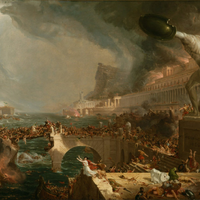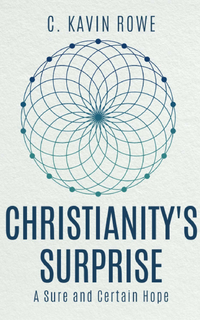Collection
- Subcollection in USA: The United States of America
- Subcollection in USA: America's Crisis
What’s Wrong With Society? What’s Wrong With Us? What’s Wrong With Me?
Recap: Recap: 1. Sin 2. Power play masked as moral justification 3. Ideology 4. Dominant Ideology of the “autonomous self” 5. Our corrosive roles degenerate society 6. The Totalitarian machine 7. Driving the Machine
The entire What's Wrong With Society series below is now compiled and updated on my blog here.
What's Wrong With Society?
Part 7C. Driving the Machine.
If we’re only doing things because they are illegal or not, and not whether it’s right or wrong, then unveiling the facade of the system means we can unleash ourselves to do whatever we want. And without virtue, we’ll likely embrace vice.
And that gets to the heart of the problem.
James, the brother of Jesus said this is what causes war and conflict. War outside of us is a result of war inside of us coming out.
“What is the source of wars and fights among you? Don’t they come from your passions that wage war within you? You desire and do not have. You murder and covet and cannot obtain. You fight and wage war. You do not have because you do not ask. You ask and don’t receive because you ask with wrong motives, so that you may spend it on your pleasures.” - James 4:1-3 CSB
What's Wrong With Society?
Part 7B. Driving the Machine.
“Why is Trump so popular? Because he said the system the rigged. And he knows the system is rigged because he uses the rigged system.”
Trump called out the system, gave his personal witness, and exposed the hypocrisy of the Democrats who are also using the system, but doing it secretly.
Trump said he’d drain the swamp but he himself is the swamp thing. Trump is doing everything the swamp does, he’s just not hiding it.
“Trump is what I call an honest liar.”
That’s another line from Chapelle.
The explicit corruption of Trump has exposed the corruption of the system.
But it’s also opened Pandora’s box for others to follow in his footsteps.
Bit starts at 8:43 in video clip.

What’s wrong with society? Part 2.
We’re morally impoverished while thinking we’re morally wealthy.
Most of our moral reasoning is tribal. Our lives matter but your tribe’s lives don’t.
What makes one tribe’s moral reason superior to another? What the leaders say is moral and whichever group is stronger.
Much of our moral reasoning is a cover story for power plays.
Jesse Nigro summarizes the philosopher Alasdair MacIntyre’s work.
Here’s some key insights.
- MacIntyre’s “disquieting suggestion” is that our capacity for ethical discourse is long gone, even if we never noticed its absence.
- Nowadays, we have a lot of people making appeals to “objective” ethical standards that are incompatible.
- Emotivism is the theory that all moral speech is actually just a disguise for arbitrarily asserting one’s opinion or will.
- This is the default position of societies where competing ethical theories render moral terms (like “just” or “good”) meaningless.

What's Wrong With Society?
Part 6B. The Machine.
Kingsnorth describes the machine as follows:
“The ultimate project of modernity, I have come believe, is to replace nature with technology, and to rebuild the world in purely human shape, the better to fulfill the most ancient human dream: to become gods. What I call the Machine is the nexus of power, wealth, ideology and technology that has emerged to make this happen.“
At the heart of the machine, is the answer to the question, what does it mean to be human?
Kingsnorth again…
“[the machine's]modus operandi is the abolition of all borders, boundaries, categories, essences and truths: the uprooting of all previous ways of living in the name of pure individualism and perfect subjectivity. We are not made by the world now; we make it. And we can make anything we want. Or so we want to believe.”
There are things we can do to live in the machine but not be a part of the machine (in the world, but not of the world).

What is wrong with society?
Part 6A. The Machine.
We have created a machine. We’re all working on different parts of it. Some of us are working on it while thinking we’re fighting the machine.
Paul Kingsnorth writes about the machine. Over the years and through his studies, he became a Christian after exploring many alternatives and resisting the idea. You can read about his story here
The machine is a societal and technological manifestation of the “autonomous self” ideology. And it is totalitarian in its core. Things are rapidly unfolding. There’s probably not much we can do to stop the machine.
Paul Kingsnorth writes about the machine. Over the years and through his studies, he became a Christian after exploring many alternatives and resisting the idea. You can read about his story at the link below.

What's Wrong With Society?
Part 5C. Assume Positions!
MacIntyre continues, placing this insight into this set of roles that came before it.
“[we have] notable characters in the cultural dramas of modernity: that of the therapist, who has in the last twenty years become bemused by biochemical discoveries; that of the corporate manager, who is now mouthing formulas that she or he learned in a course in business ethics, while still trying to justify her or his pretensions to expertise; and that of the aesthete, who is presently emerging from a devotion to conceptual art. So the conservative moralist has become one more stock character in the scripted conversations of the ruling elites of advanced modernity. But those elites never have the last word.”
We became gears in the machine. We think we’re fighting against the machine, but we’re actually keeping it going.
Learn more about these roles from Alasdair MacIntyre’s book, After Virtue, in the this recap video >>

What's Wrong With Society?
Part 5B. Assume Positions!
The Left and Right are two sides of the same coin. We see one side doing bad so we fight back failing to see we’re doing the same bad.
We fuel the cycle of retaliation. They hit me, so I hit back. And we spiral into brokenness, blame, and revenge seeking.
Because we’re ideological and not morally grounded, we reactively continue to spin the merry-go-round.
In the third edition prologue of his book, After Virtue, Alasdair MacIntyre describes the two parts of liberalism.
“That conservatism is in too many ways a mirror image of the liberalism that it professedly opposes. Its commitment to a way of life... is a commitment to an individualism as corrosive as that of liberalism. And, where liberalism by permissive legal enactments has tried to use the power of the modern state to transform social relationships, conservatism by prohibitive legal enactments now tries to use that same power for its own coercive purposes.”
What's Wrong With Society?
Part 5A. Assume Positions!
Societal Role-play drives corrosive effects and drive the cycle of retaliation
Think of society like we’re all in a play acting different parts of the story. We see the play unfolding. Because our ethics and moral grounding is shattered and shallow, we have no inherited identity. We make our own identity, and we step into different roles. Often; we see others playing their roles and we react to them by stepping into a counter role. These roles give a sense of order to the chaos and a sense of meaning to our lives.
Here are some stock characters that arise in this context, according to Alasdair MacIntyre
1. The Manager
2. The Bureaucrat
3. The Therapist
4. The Aesthete
5. The Scientist
6. The Conservative Moralist
Which role are you playing?
Something is wrong and we know it. But we lack what’s needed to truly discover what’s missing and how to live it out.

What's Wrong With Society?
Part 4B. The Autonomous Individual
This dominant ideology is corrosive to us as individuals and society. We’re entangled in it, some more than others.
Rowe continues.
“that the story of the autonomous individual cannot fund life together. It will break down and eventually fail, and the lives we've hoped to live together will come apart.”
How does this play out in society?
“Lawyers have a central place in the story of the autonomous individual precisely because they must exist to enforce the contracts that we agree to but to which we are not truly bound.”
“Law, and the force that backs it, are conceived and used as resistance to the implosion of a society that believes the story of the autonomous individual.”
All of this is descriptive and helpful for making sense of the political polarization and conflict that has, is, and will continue to play out.
Dive deeper by watching my discussion with Rowe below.

What's Wrong With Society?
Part 4A. The dominance of the “autonomous self” ideology in America and the West.
The autonomous self is a distorted view of freedom. It is this vision of what it means to be human that we are rapidly moving towards and that our technology dynamic makes possible.
“the story of the autonomous individual says that the "I" is self-sovereign, emerges into without any prior obligations that have been placed on it, and chooses the laws it has for itself.”
“Nothing can be forced upon the autonomous self from without that it does not agree to from within. When someone or something— a person, other people, various groups, governments, and so forth-tries to force the "I" to accept something it does not will to accept, the "I" is violated. The border between the "I" and the world of self-chosen obligations has been broken, and the invaders have entered territory that is not theirs.”

What's Wrong With Society?
Part 3B. Ideology.
In David Koyzis book, political visions and illusions, he surveys the most dominant ideologies in our country. He claims that they become forms of idolatry, where the thing they espouse becomes the most important thing (essentially they become a god we worship).
- Liberalism (superiority of individual sovereignty)
- Democratism (superiority of collective participation)
- Nationalism (superiority of the nation)
- Socialism (superiority of communal ownership)
- Conservatism (superiority of the past)
Koyzis argument is not that these ideologies don’t have a place but rather they need to be integrated into their proper place inside a higher order. Otherwise they distort and corrupt.
Dive deeper into this topic by watching my discussion on the subhect with David Koyzis on the Share Life podcast.



